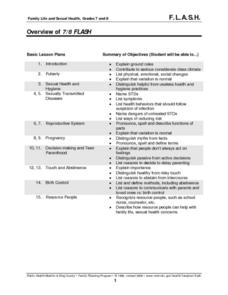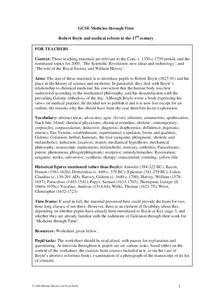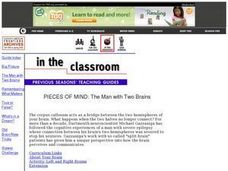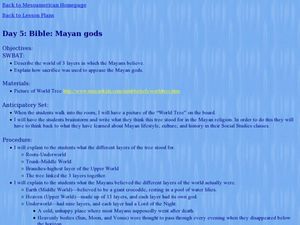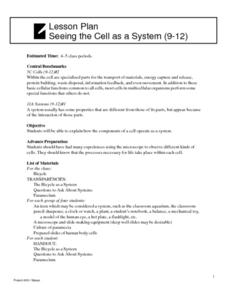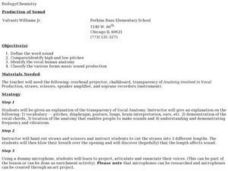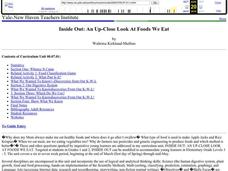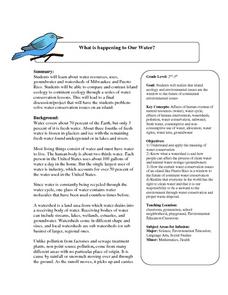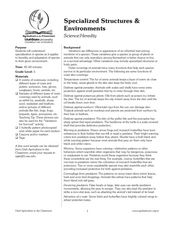Curated OER
Bacteria Aren't All Bad!
Teaching students about the diversity of the Bacteria Kingdoms and their importance to humans
Curated OER
FLASH
Students Distinguish among assertive, aggressive, passive and manipulative behaviors,Describe consequences of each,Formulate an assertive request,Describe how it feels to risk rejection. Students Describe how human immunodeficiency virus...
Curated OER
Winter Holiday Activities Extravaganza
Students define culture and explore elements that are part of the custom or culture of a place. In this holiday lesson, students identify the cultures they participate in. Students identify the differences in people's cultures....
Curated OER
Equal Rights
Pupils experience what it would be like for any one group to make the laws that all people are to follow.
Michael Hunter and Fiona Kisby
Robert Boyle and Medical Reform in the 17th Century
Introduce pupils to the work of Robert Boyle and his influence on medical practice through a series of informational texts and discussion questions.
E Reading Worksheets
Main Idea with Robots
Androids, cyborgs, and robonauts? Kids are sure to be engaged by the thematically related passages on a reading comprehension worksheet that asks them to summarize the passage in one sentence, and then develop an appropriate title that...
Howard Hughes Medical Institute
Viral DNA Integration
How do reverse transcriptase inhibitors work? Young virologists examine the function of azidothymidine, a drug doctors use to treat HIV patients, during a hands-on modeling activity. Groups create a strand of DNA from an HIV RNA strand...
Curated OER
Honeybee
Students investigate honeybees and the importance of honeybees to humans. They identify the various parts of a bee's body using velcro parts, role-play a hive, and answer review questions.
Curated OER
Microbes 1: What's Bugging You?
Students build on existing knowledge of microbes, focusing on the relationship between microorganisms and foodborne illness, as well as the implications that foodborne illness has on human health.
Curated OER
Animal Adaptations
students in groups to work on bulletin board, making a list of animal adaptations. They write an example of each body covering and find pictures of animals with these coverings. They mount pictures and label the covering. They should be...
Curated OER
The Chemistry Connection
For this proteins worksheet, students read about the chemical compound, protein. Students determine where proteins are found in the body and how enzymes help the body react. Then students complete 3 short answer questions.
Curated OER
The Journey of a Red Blood Cell
Fifth graders examine how a red blood cell travels throughout the body. Using a model, they recreate the flow of blood through the heart. They also label the lungs and the differece between the blood that enters the heart and the blood...
Curated OER
Brillant, Beautiful Bats!
Students use the internet to gather information on bats. They write their own bat poem and describe the differences between the parts of a bat's body. They identify how bats are important to humans and how they control the insect...
Curated OER
Air and Water in the Environment
Second graders participate in a three part lesson in which they identify and describe forms of moisture in the environment. Part one of the lesson involves the three stages of the water cycle, part two focuses on creating humidity by...
Curated OER
Left and Right Brains
Students research the part of the brain known as the corpus callosum. The part of the brain that connects the left and right brain, students investigate its functions and how data passes from one side to another.
Curated OER
Digestion and Nutrition
In this homeostasis worksheet, students will read about how the food we eat helps our body to maintain homeostasis. Students will complete 1 short answer question and 3 true or false questions.
Curated OER
Bible: Mayan Gods
Students discover beliefs and practices of the Mayans. In this Mayan gods lesson, students discuss "The World Tree" of the Mayans, the three layers of the tree, and their meanings. Students discover the manner and purpose of the Mayan...
Curated OER
Seeing the Cell as a System
Students explain how the components of a cell operate as a system. Students examine a bicycle and find out if parts were arranged differently, could the system still be carried out. They look at cells as well and see what function they...
Curated OER
Proper Hygiene
Third graders discuss the importance of personal hygiene and cleanliness. They examine why good oral hygiene is a significant part of maintaining a healthy body. They focus on the need for daily baths, hair care, and teeth cleaning. They...
Curated OER
Vocal Exploration
Students explore vocal anatomy. In this biology/music lesson, students first learn vocabulary associated with the voice and body. They then use straws, microphones and recorders to differentiate between high and low pitches and...
Curated OER
Inside Out: An Up-Close Look At Foods We Eat
Fourth graders identify the origins of meats and vegetables consumed by humans on a daily basis. They classify foods (meats, dairy products, grains...) and create a food pyramid.
Curated OER
Major Functions
Seventh graders investigate the basic characteristics and needs of living things. They identify the major parts of plants and animals by making lists. Students focus upon one living thing and speculate how if one part is changed how it...
Curated OER
What is Happening to Our Water?
Students compare and contrast Wisconsin's water resources to that of Puerto Rico. They research books about islands, particularly the Puerto Rican islands. Student view illustrations of island ecology. They discuss the illustrations and...
Curated OER
Specialized Structures and Environment
Fifth graders read about how different animals protect themselves, and how characteristics give animals an advantage in their environment. Students then discuss a variety of "outer" wear for humans, and what they might choose to wear in...
Other popular searches
- Human Body Parts Pictures
- Spanish Human Body Parts
- Human Body Parts Edible
- Human Body Parts Bingo
- Main Human Body Parts
- The Human Body Parts
- Human Body Parts Photographs
- Human Body Parts Worksheet
- Pics Human Body Parts
- Human Body Parts Names
- Human Body Parts Poster
- Parts of the Human Body



